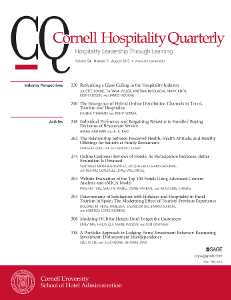Listen to the Latest Podcast from Cornell Hospitality Quarterly!
 In the latest podcast from Cornell Hospitality Quarterly, Robert E. Pitts discusses his article “The Influence of Message Framing on Hotel Guests’ Linen-Reuse Intentions.” The study, conducted with article co-authors Julie E. Blose and Rhonda W. Mack in Charleston, SC, examined participants’ opinion of how they would respond to various message frames.
In the latest podcast from Cornell Hospitality Quarterly, Robert E. Pitts discusses his article “The Influence of Message Framing on Hotel Guests’ Linen-Reuse Intentions.” The study, conducted with article co-authors Julie E. Blose and Rhonda W. Mack in Charleston, SC, examined participants’ opinion of how they would respond to various message frames.
You can click here to download the podcast. You can also read the article for free by clicking here.
Like what you hear? Click here to browse more podcasts from Cornell Hospitality Quarterly and here to subscribe to the SAGE Management and Business podcast channel on iTunes. You can also sign up for e-alerts and get notifications of all the latest research from Cornell Hospitality Quarterly sent directly to your inbox!
 Julia E. Blose received her PhD from Florida State University. She is currently an associate professor of Marketing in the Department of Management and Marketing in the School of Business at the College of Charleston.
Julia E. Blose received her PhD from Florida State University. She is currently an associate professor of Marketing in the Department of Management and Marketing in the School of Business at the College of Charleston.
 Rhonda W. Mack received her PhD from the University of Georgia. She is currently professor of marketing and associate dean of Undergraduate Programs in the Department of Management and Marketing in the School of Business at the College of Charleston.
Rhonda W. Mack received her PhD from the University of Georgia. She is currently professor of marketing and associate dean of Undergraduate Programs in the Department of Management and Marketing in the School of Business at the College of Charleston.
 Robert E. Pitts received his PhD from the University of South Carolina. He is currently a professor of marketing in the Department of Management and Marketing in the School of Business at the College of Charleston. He has served as dean of the School of Business and Economics at the College of Charleston and the College of Business Administration at Creighton University, Omaha.
Robert E. Pitts received his PhD from the University of South Carolina. He is currently a professor of marketing in the Department of Management and Marketing in the School of Business at the College of Charleston. He has served as dean of the School of Business and Economics at the College of Charleston and the College of Business Administration at Creighton University, Omaha.































































































